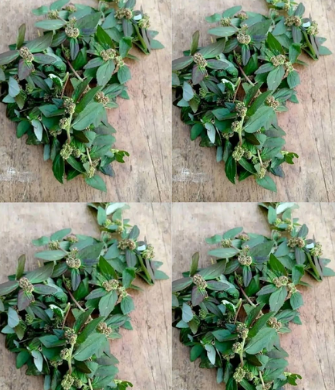
Introduction to Euphorbia Hirta
Euphorbia hirta, often called the asthma plant, is a small herb that has earned a big reputation in traditional medicine around the world. From Asia to Africa, healers have relied on this plant to treat ailments ranging from respiratory distress to skin problems. Its versatility, combined with centuries of proven use, makes Euphorbia hirta a valuable natural remedy that continues to spark interest today. Let’s dive into the fascinating benefits of this herb and why it remains relevant even in modern times.
Respiratory Relief and Asthma Support
As its common name suggests, Euphorbia hirta is best known for helping people manage asthma and other breathing difficulties. Traditional medicine often recommends boiling its leaves into a tea or decoction to soothe persistent coughs, bronchitis, and wheezing. Its bronchodilatory properties relax the airways, allowing smoother airflow and easier breathing. In regions where access to pharmaceuticals may be limited, this plant has often been the difference between relief and struggle.
Healing the Digestive System
Digestive issues like diarrhea and dysentery are among the most common ailments worldwide, and Euphorbia hirta has been a trusted solution for generations. The plant’s leaves, when brewed, create a calming effect on the gastrointestinal tract. Known for its antidiarrheal and anti-inflammatory qualities, this herb can help reduce spasms and ease discomfort associated with irritable bowel syndrome (IBS). Its role in supporting gut health has kept it firmly rooted in many folk medicine traditions.
Natural Skin Care and Wound Treatment
When applied topically, Euphorbia hirta becomes a reliable ally for skin health. Traditional healers have long crushed the leaves into a paste or infused them in water to treat rashes, boils, warts, and wounds. Its antimicrobial and anti-inflammatory properties not only soothe irritation but also help prevent infections. In some cultures, it’s considered a natural wound healer, offering protection and speeding up recovery in the absence of modern antiseptics.
Antimicrobial and Antifungal Power
One of the reasons Euphorbia hirta is so widely used is its ability to fight microbes. Folk practices highlight its role in treating bacterial, fungal, and even viral infections. Although scientific studies are still ongoing, early research shows promising antimicrobial effects. This broad-spectrum activity makes the plant useful for both internal remedies and external applications on skin infections.
Pain Relief and Anti-Inflammatory Action
Nature has its own way of providing relief from pain, and Euphorbia hirta is one of those gifts. Its analgesic and anti-inflammatory properties make it useful for soothing arthritis pain, headaches, and muscle strains. Traditional methods include drinking its tea for internal relief or applying it as a poultice to sore muscles. Think of it as a natural, plant-based pain reliever passed down through generations.
Video : Tawa Tawa Leaf Tea : Uses and Benefits ( Euphorbia Hirta)
Reducing Fevers Naturally
Fever is a common symptom in many illnesses, and Euphorbia hirta has been relied on as a cooling herbal treatment. A tea made from the leaves is said to lower body temperature and provide comfort during feverish conditions. While more clinical evidence is needed, traditional medicine has long embraced its fever-reducing potential, especially in areas with limited access to modern treatments.
Support for Urinary Tract Health
In traditional medicine systems, Euphorbia hirta is valued for its diuretic properties. By promoting urine flow, it can help flush out bacteria from the urinary tract, offering relief from infections and bladder inflammation. Drinking a decoction made from its leaves remains a common practice in many rural communities for maintaining urinary health.
Antioxidant Protection for the Body
Oxidative stress is a major contributor to chronic diseases like diabetes, heart disease, and cancer. Euphorbia hirta contains antioxidants that help neutralize free radicals and protect cells from damage. Regular use of this herb, often in the form of tea, can support the body’s defenses against long-term health risks while promoting overall vitality.
Boosting Immunity and Fighting Illness
Euphorbia hirta is more than just a remedy for specific ailments—it’s also believed to strengthen overall immunity. With its antimicrobial and antioxidant powers, it enhances the body’s ability to ward off infections and recover faster from illness. Many traditional healers recommend it as a general tonic for maintaining good health.
Managing Blood Sugar Levels
Though still being studied, Euphorbia hirta has shown potential in balancing blood sugar levels. Some traditional systems use it as a natural way to support people with diabetes. Its possible role in glucose regulation could make it an affordable and accessible option for communities in need, though medical guidance is essential before using it for this purpose.
Relieving Muscle Spasms and Cramps
Muscle spasms can be painful and disruptive, whether in the gut or elsewhere in the body. Euphorbia hirta has long been used to calm these involuntary contractions. Its antispasmodic properties relax muscles, offering relief in conditions like IBS or painful stomach cramps. Externally, poultices are also used to soothe tense or sore muscles.
How to Prepare Euphorbia Hirta
The most common preparation is tea or decoction. To make it, boil fresh or dried leaves in water for several minutes, strain, and drink. For topical applications, crush the leaves into a paste or mix them into water to apply directly to the skin. These simple methods ensure the plant’s benefits can be accessed with minimal resources.
Safety and Precautions
Despite its long tradition of use, Euphorbia hirta should be approached with care. Overconsumption may lead to toxicity, and its effects can vary depending on individual health conditions. Pregnant or breastfeeding women, as well as people on medication, should consult a healthcare professional before use. Natural does not always mean harmless, so caution and moderation are key.
Video : The Health Benefits of Tawa-tawa | Euphorbia Hirta | Another Potent Herb To Fight Dengue Fever
Conclusion: A Timeless Healing Herb
Euphorbia hirta, the humble asthma plant, proves that powerful remedies often come in small packages. With benefits ranging from respiratory support and digestive relief to antimicrobial protection and skin healing, this herb has earned its place in traditional medicine worldwide. While more scientific research is needed to validate every claim, the centuries of reliance on this plant speak volumes. By respecting its power and using it responsibly, Euphorbia hirta can continue to serve as a natural ally for health and wellness.


